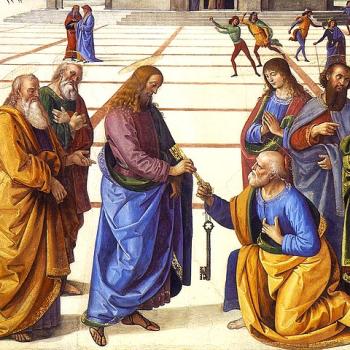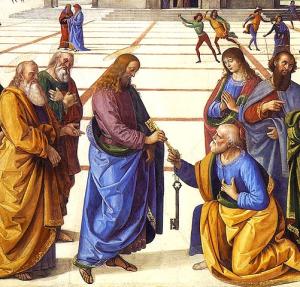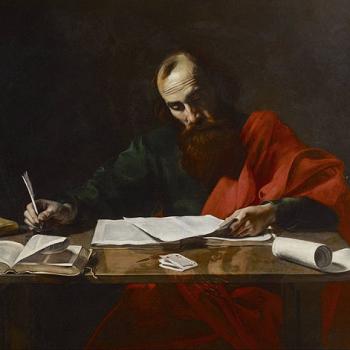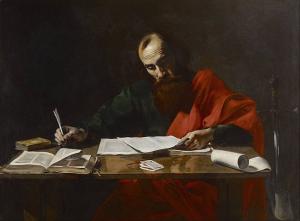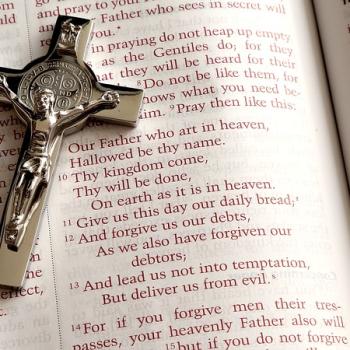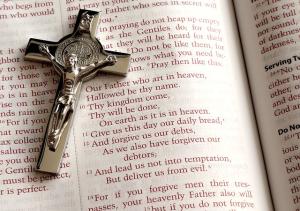Lucas Banzoli is a very active Brazilian anti-Catholic polemicist, who holds to basically a Seventh-Day Adventist theology, whereby there is no such thing as a soul that consciously exists outside of a body, and no hell (soul sleep and annihilationism). This leads him to a Christology which is deficient and heterodox in terms of Christ’s human nature after His death. He has a Master’s degree in theology, a degree and postgraduate work in history, a license in letters, and is a history teacher, author of 25 books, as well as blogmaster (but now inactive) for six blogs. He’s active on YouTube.
***
The words of Lucas Banzoli will be in blue. I used Google Translate to transfer his Portugese text into English.
*****
This is a reply to Lucas’ article, “Conheça toda a perseguição e proibição da Igreja Católica à leitura da Bíblia!” [Know all the Catholic Church’s persecution against and prohibition of reading the Bible!] (4-28-18). It’s a massive article: more than 14,000 words, and there is quite a bit of documentation, too (164 footnotes). But Lucas is only presenting one side. Many of his citations need to be understood in larger immediate or historical context.
Moreover, one must also understand that there was plenty of Protestant suppression of Bibles (whether justified or not) as well, and on the same basis as the Catholic rationale (they were thought to be dad and/or dangerous translations). By never presenting those sorts of facts, an entirely one-sided and unfair perspective is set forth. It’s well worth the time to refute assertions in this article from documented facts of history: to at least give Catholic and fair-minded non-Catholic readers another side of the issue.
Those who seek historical truth will read different perspectives. There is never only one. As the old saying goes, “there are two sides to every story.” This is particularly true concerning Protestant-Catholic historical divisions. Feelings and party loyalties run very high. Even if both sides (Catholic and Protestant) regarding this issue are highly biased (and we all have our biases), it’s still good to read both so as to achieve a much more balanced and well-rounded picture.
This article is by far the most complete study available on the internet on the subject, which brings together the largest number of primary sources and quotes from scholars and historians to leave no room for doubt.
It’s long and detailed, but it’s biased and one-sided.
All material is taken from a chapter in my book on the Reformation, in the final stages of construction.
Duly noted.
“They tell you that the Scriptures must not be in your mother tongue, but that is only because they want to blindfold you and lead you into captivity.” (William Tyndale)
This headline-like citation illustrates the slanted perspective right off the bat. The Catholics are the “bad guys.” The reader knows exactly what he or she will be getting. But creating “bad guys” in historical analysis when it is a matter of honestly held religious differences, generally leads to bad and untrustworthy research. The Catholic regards (or should regard, according to what the Catholic Church teaches) Protestants as fellow Christians and “separated brethren.” But the anti-Catholic Protestant (not all Protestants! just a tiny minority) views Catholicism as a non-Christian cult or heresy. The diametrically opposed difference of perspective leads to massively different “spirits” in how one goes about analyzing an opposing viewpoint.
Among the documents he cited (which we will examine later) that prove that the Church prohibited the reading of the Bible were the Council of Toulouse (1229) . . .
This is not “the Church.” It was a local synod, specifically reacting to distorted translations or interpretations of Holy Scripture by the wildly heretical Albigensians and Cathari. The entire population of Toulouse was only about 32,000 in 1229. The estimated population of Europe in 1200 was 68 million, and 72.9 million in 1250. Thus, the decree of the synod of Toulouse in 1229 (using the European population of 1250) affected approximately only one out of 2278 Europeans (or, 0.04%): hardly a blanket condemnation / prohibition of Scripture!
The Albigensians were a Gnostic- and Manichaean-inspired heresy, which believed that matter was entirely evil. The Catholic Encyclopedia (1913), in its article, “Albigenses” describes some of their more bizarre beliefs and practices:
Jesus Christ . . . is still a mere creature. The Redeemer could not take on a genuine human body, because he would thereby have come under the control of the evil principle. . . .
[T]he liberation of the soul from its captivity in the body is the true end of our being. To attain this, suicide is commendable; it was customary among them in the form of the endura (starvation). The extinction of bodily life on the largest scale consistent with human existence is also a perfect aim. As generation propagates the slavery of the soul to the body, perpetual chastity should be practiced. Matrimonial intercourse is unlawful; concubinage, being of a less permanent nature, is preferable to marriage. Abandonment of his wife by the husband, or vice versa, is desirable. . . .
Properly speaking, Albigensianism was not a Christian heresy but an extra-Christian religion . . . What the Church combated was principles that led directly not only to the ruin of Christianity, but to the very extinction of the human race.
For much more on this dangerous, radical sect and the related Cathari (documented mostly by Protestant scholars), see my article, Were the Albigensians Primitive or Proto-“Protestants”? [6-7-98]. Once we understand what the council of Toulouse was reacting against, the more we understand that it was concerned with a very likely attack on the Bible, in order to promulgate these wild, demonic doctrines. That’s not being “against” the Bible. It’s being concerned for the integrity and right preservation of the Bible.
The Cambridge History of the Bible (not a Catholic work) stated that “no universal and absolute prohibition of the translation of the Scriptures into the vernacular nor of the use of such translations by clergy or laity was ever issued by any council of the Church or any pope” (p. 391). The 1910 New Catholic Dictionary (“Bible Reading by Laity”) reiterates this opinion:
In the history of the Church there never has been a general prohibition against the reading of the Bible by the laity. While the Church does not consider Bible reading necessary for salvation, she has always approved such reading under proper conditions. In consequence, we find that any restrictions which the Church has placed on the reading of the Bible were aimed at the use of heretical or corrupt versions, or versions without proper notes or authorization, and not against the reading of the Bible itself. The Albigenses and Waldenses who appealed to unauthorized and, at times, corrupt versions in their disputes with Catholics, gave occasion for the first restrictive decrees. These decrees, edited by the Synods of Toulouse (1229), Tarragona (1234), and Oxford (1408), aimed to restrict the reading of the Bible in the vernacular. [my bolding]
It should also be pointed out that early Protestantism was fully behind censorship of views that each particular sect disagreed with. We grant that each had sincere and defensible views as to a proper Bible translation, just as the Catholic Church did and does. But their suppression of “dissenting” views was certainly no less strong than corresponding Catholic efforts, and arguably more severe in many instances: not to mention more hypocritical, since the myth of the so-called “Reformation” is supposed “freedom of the individual and their conscience” all-around. That was never true, and it’s not true with regard to censorship, either.
For example, one of Martin Luther’s Catholic debate partners, Jerome Emser, produced a German version of the New Testament in 1527. Ironically, it was scarcely different from Luther’s translation. His Wikipedia article states that “his own version is merely Luther’s adapted to Vulgate requirements.” So that shouldn’t have been a big deal, right? But how did Luther react to it?:
Luther . . . set his pen in motion concerning this Catholic translation of the Bible. ‘The freedom of the Word,’ which he claimed for himself, was not to be accorded to his opponent Emser . . . When . . . he learnt that Emser’s translation . . . was to be printed . . . at Rostock, he not only appealed himself to his follower, Duke Henry of Mecklenburg, with the request that ‘for the glory of the evangel of Christ and the salvation of all souls’ he would put a stop to this printing, but he also worked on the councillors of the Elector of Saxony to support his action. He denied the right and the power of the Catholic authorities to inhibit his books; on the other hand he invoked the arm of the secular authorities against all writings that were displeasing to him. (Johannes Janssen, History of the German People From the Close of the Middle Ages, 16 volumes, translated by A. M. Christie, St. Louis: B. Herder, 1910 [originally 1891], vol. XIV, 503-504)
Not only were Catholic Bibles forbidden and censored in many Protestant districts, but all Catholic works whatever, as Janssen noted:
[I]n Protestant districts all Catholic books, were strictly prohibited, and the printers forbidden under penalty to publish them. (Janssen, ibid., p. 502).
My point is that these practices (like the larger issue of religious intolerance and persecution) were well-nigh universal at the time. The big problem I have is that we always hear about Catholic censorship: which is twisted and exaggerated, while hearing next to nothing about Protestant censorship, which was in some ways more massive and autocratic and arbitrary than Catholic supervision of Bible-reading and other reading that the Church thought was proper or improper.
Among the documents . . . that prove that the Church prohibited the reading of the Bible were . . . the Council of Trent (1545–1563) . . .
Really? That’s news to me. Trent, like the council of Toulouse, was concerned with distortions and unauthorized versions of the Bible. It decreed concerning “the Edition, and the Use, of the Sacred Books” (Session 4: 1546):
And wishing, as is just, to impose a restraint, in this matter, also on printers, who now without restraint,–thinking, that is, that whatsoever they please is allowed them,–print, without the license of ecclesiastical superiors, the said books of sacred Scripture, and the notes and comments upon them of all persons indifferently, with the press ofttimes unnamed, often even fictitious, and what is more grievous still, without the author’s name; and also keep for indiscriminate sale books of this kind printed elsewhere; (this Synod) ordains and decrees, that, henceforth, the sacred Scripture, and especially the said old and vulgate edition, be printed in the most correct manner possible; and that it shall not be lawful for any one to print, or cause to be printed, any books whatever, on sacred matters, without the name of the author; nor to sell them in future, or even to keep them, unless they shall have been first examined, and approved of, by the Ordinary . . .
Besides the above, wishing to repress that temerity, by which the words and sentences of sacred Scripture are turned and twisted to all sorts of profane uses, to wit, to things scurrilous, fabulous, vain, to flatteries, detractions, superstitions, impious and diabolical incantations, sorceries, and defamatory libels; (the Synod) commands and enjoins, for the doing away with this kind of irreverence and contempt, and that no one may hence forth dare in any way to apply the words of sacred Scripture to these and such like purposes; that all men of this description, profaners and violators of the word of God, be by the bishops restrained by the penalties of law, and others of their own appointment.
Trent also produced “Ten Rules Concerning Prohibited Books” (December 1563). Here’s a portion of that:
I
All books which have been condemned either by the supreme pontiffs or by ecumenical councils before the year 1515 and are not contained in this list, shall be considered condemned in the same manner as they were formerly condemned.
II
The books of those heresiarchs, who after the aforesaid year originated or revived heresies, as well as of those who are or have been the heads or leaders of heretics, as Luther, Zwingli, Calvin, Balthasar Friedberg, Schwenkfeld, and others like these, whatever may be their name, title or nature of their heresy, are absolutely forbidden. The books of other heretics, however, which deal professedly with religion are absolutely condemned. Those on the other hand, which do not deal with religion and have by order of the bishops and inquisitors been examined by Catholic theologians and approved by them, are permitted. Likewise, Catholic books written by those who afterward fell into heresy, as well as by those who after their fall returned to the bosom of the Church, may be permitted if they have been approved by the theological faculty of a Catholic university or by the general inquisition.
In summary: Bible translations from heretics are mostly prohibited; their translations of other texts requires ecclesiastical approval. The Catholic Church simply wanted to check out and approve vernacular translations of the Bible. What in the world is wrong with that? It’s no different from Protestants being concerned to read a translation that is accurate and true to the original Hebrew and Greek manuscripts. In section VI of this decree, it was stated also that theological writings in the vernacular languages (like Bibles) require Church approval. But they weren’t absolutely prohibited.
This is little different in the main from the strong allegiance of many Protestants to the King James Version of 1611. It’s not “anti-Bible” to favor that version, nor is it “anti-Bible” for the Catholic Church to strongly prefer its “standard”: the Latin Vulgate of St. Jerome and other approved versions drawn and inspired by it. Ecclesiastically approved vernacular versions had been encouraged and accepted all along. None of this is anti–Bible at all. Robert E. McNally, SJ, sums it up:
While it is true that the Council did not explicitly approve of translations of the Bible in the language of the people, it is equally true that it did not condemn the preparation and dissemination of such popular versions. (“The Council of Trent and Vernacular Bibles”, pp. 225-226)
Lastly, if it is objected that Trent and the Catholic Church of the time only allowed the “official” versions of the Latin Vulgate, this, too, is demonstrably untrue. Catholic writer Barrett Turner made very interesting and helpful analyses of Trent and the Bible:
Trent nowhere forbids the use of the original languages, as if St. Jerome had not used them to revise the Old Latin texts or make his own translations. . . .
[S]cholars who remained within the Catholic Church had begun to use the original languages before Protestants started openly defying the Church’s leadership and traditions. One need look no further than the Complutensian Polyglot (1516), completed in Alcala, Spain, under Cardinal Ximenes, who dedicated the work to Pope Leo X, or the Greek edition of the New Testament edited by Erasmus of Rotterdam (1466-1536) [with the permission of the same pope, and published in 1516]. Such scholars desired to see greater familiarity with Sacred Scripture and were no less ardent in calling for the reform of abuses than were Protestants. . . .
The reluctance of the Council to ban translations of the Bible into vernacular languages opened the door for translations such as the Reims New Testament (1582) and the entire Douai-Reims Bible (1609-1610). . . .
Enshrining the Vulgate as the “authentic” edition does not mean that the Vulgate cannot be revised in light of the best Latin manuscripts or that one may never correct the Latin text using the Hebrew or Greek manuscript traditions. In this openness to humanistic textual criticism, the Tridentine Fathers order that the Vulgate be corrected after the Council such that one version attaining as closely as possible to Jerome’s original translation would find universal use. The employment of Greek and Hebrew to correct the Latin was not forbidden in any way. The revision of the Vulgate was completed under popes Sixtus V and Clement the VIII and published in 1598. (“Calvin, Trent, and the Vulgate: Misinterpreting the Fourth Session”, Called to Communion, 6-13-11)
All of this is clearly conscientious, responsible regulation of the proper translation of Holy Scripture for the spiritual well-being of the people. To characterize this as “prohibit[ing] the reading of the Bible” is plainly a distortion of the reality: especially when committed by one as educated (in history!) as Lucas. Accuracy and good research is Task #1 in apologetics.
For further related reading, see my “Council of Trent: Anti-Bible or Anti-Bad Bible Translations?” [5-12-21].
The third supposed scandalous “prohibition” mentioned was “a Dogmatic Constitution of Pope Clement XI, entitled Unigenitus Dei Filius (1713).” Lucas has a field day with it. An absolutely indispensable analysis of this document is the article, “Did the Church Forbid Bible Study?” (1-20-12), by Catholic apologist Jimmy Akin. One interested in this specific topic simply must read the whole thing. But here are some key portions where he summarizes the gist of Unigenitus:
It does not seem to be “We reject the idea of individual study of Scripture since Scripture is unclear.” If a person has proper preparation (has a proper grounding in the faith, isn’t going to leap to heretical conclusions, is well informed about the methods of Scripture interpretation, etc.) then what would be wrong with him studying on his own? . . .
[I]t’s okay for a person to say, “By God’s providence the Scriptures are not as clear as I would need them to be to study them on my own. I’m in the position of the Ethiopian eunuch, who can’t discern important points on his own, without guidance. The fact that the Scriptures contain this level of mystery is a reason for me not to do Bible study without guidance.” . . .
[T]here are good reason for not endorsing universal, unguided Scripture study. Some people are simply not prepared for it. . . .
It also seems to me that they [the above propositions] do not add up to a rejection of individual Scripture study for those who are properly prepared for this. They are merely rejecting the idea that unguided Scripture study should be universally engaged in by all Christians, regardless of their level of preparation, and Christians are not at fault if they do not feel themselves prepared to undertake this task and are content to learn the Scriptures under ecclesiastical guidance.
Jimmy in effect fully refutes Lucas’ accusations about Unigenitus, with far more subtle and nuanced analysis than Lucas provides. For related reading, see my ““Unigenitus” (1713) vs. Personal Bible Study? (+ Other Supposed “Anti-Bible” Catholic Proclamations & Analogies to Calvinist “Dogmatism” at the Synod of Dort) [5-14-21].
We have here a Dogmatic Constitution, dealing with matters of faith, signed by an infallible pope and confirmed by other infallible popes and councils, rejecting with all the horror of the world the reading of Sacred Scripture for all lay people, . . .
Nonsense. Read Jimmy’s article to be disabused of this shallow and hostile interpretation of its meaning. Lucas cited some Catholic apologists who didn’t know what they were talking about in this instance. It’s the old tactic of “find the worst opponents of your position, not the best.” Jimmy Akin is one of the best Catholic apologists in the world, and has been for over 25 years now. He is never cited a single time in Lucas’ 14,000 words + treatment of this topic (nor are any number of credentialed, professional apologists).
Lucas cites the historian Paul Johnson, who is a Catholic (I read his huge and excellent book, Modern Times, over thirty years ago), stating:
From the 13th century onwards, many vernacular versions of the New Testament began to circulate in different languages. From the late 14th century onwards, the availability of the Bible to the public became the central object of disputes between the Church and its critics, such as the Wycliffists and Hussites. No popular Bibles were allowed by the authorities, except in Bohemia . . . (History of Christianity. Rio de Janeiro: Imago Ed., 2001, p. 329)
This is — with all due respect to Johnson — untrue. In fact, the Catholic Church has always been a big advocate of vernacular Bibles. The true facts are quite contrary to the negative image that the anti-Catholic sector of Protestant polemicists have tried to create and foster these past 500 years. Perhaps the best and most decisive response to this myth is to cite the preface of the Authorised or “King James” 1611 English translation of the Bible, which describes the long history of vernacular translations in England long before Protestantism ever arose:
Much about that time [1360], even our King Richard the Second’s days, John Trevisa translated them into English, and many English Bibles in written hand are yet to be seen that divers translated, as it is very probable, in that age . . . So that, to have the Scriptures in the mother tongue is not a quaint conceit lately taken up, . . . but hath been thought upon, and put in practice of old, even from the first times of the conversion of any Nation; no doubt, because it was esteemed most profitable, to cause faith to grow in men’s hearts the sooner, . . .
The history of English Bible translation (preceded earlier by editions in the earlier common language of Anglo-Saxon) is very long, starting with Caedmon in the 7th century, Aldhelm (c. 700), the Venerable Bede (d. 735), followed by Eadhelm, Guthlac, and Egbert (all in Saxon, the vernacular language of that time in England). King Alfred the Great (849-99) translated the Bible, as did Aelfric (d. c. 1020). Middle English translations included those of Orm (late 12th century) and Richard Rolle (d. 1349).
Vernacular Bibles in many languages appeared throughout the early and late Middle Ages (after Latin ceased being a common, widespread language). Between 1466 and 1517 fourteen translations of the Bible were published in High German, and five in Low German. Raban Maur had translated the entire Bible into Teutonic, or old German, in the late 8th century. Between 1450 to 1520 there were ten French translations, and also Bibles rendered in Belgian, Bohemian, Spanish, Hungarian, and Russian. 25 Italian versions (with express Church sanction) appeared before 1500, starting at Venice in 1471. The Wikipedia article, “Bible translations into German” recounts the rich history of pre-Luther German Bibles:
Charlemagne promoted Frankish biblical translations in the 9th century. There were Bible translations present in manuscript form at a considerable scale already in the thirteenth and the fourteenth century (e.g. the New Testament in the Augsburger Bible of 1350 and the Old Testament in the Wenceslas Bible of 1389). There is ample evidence for the general use of the entire vernacular German Bible in the fifteenth century. In 1466, before Martin Luther was even born, Johannes Mentelin printed the Mentel Bible, a High German vernacular Bible, at Strasbourg. This edition was based on a no-longer-existing fourteenth-century manuscript translation of the Vulgate from the area of Nuremberg. Until 1518, it was reprinted at least 13 times. In 1478–79, two Low German Bible editions were published in Cologne, one in the Low Rhenish dialect and another in the Low Saxon dialect. In 1494, another Low German Bible was published in the dialect of Lübeck, and in 1522, the last pre-Lutheran Bible, the Low Saxon Halberstadt Bible was published. In total, there were at least eighteen complete German Bible editions, ninety editions in the vernacular of the Gospels and the readings of the Sundays and Holy Days, and some fourteen German Psalters by the time Luther first published his own New Testament translation.
Protestant Church historian James Gairdner confirms what I have written above:
The truth is, the Church of Rome was not at all opposed to the making of translations of Scripture or to placing them in the hands of the laity under what were deemed proper precautions. It was only judged necessary to see that no unauthorized or corrupt translations got abroad; and even in this matter it would seem that the authorities were not roused to special vigilance till they took alarm at the diffusion of Wycliffite translations in the generation after his death.
. . . To the possession by worthy lay men of licensed translations the Church was never opposed; but to place such a weapon as an English Bible in the hands of men who had no regard for authority, and who would use it without being instructed how to use it properly, was dangerous not only to the souls of those who read, but to the peace and order of the Church. (Lollardy and the Reformation in England, Vol. 1 of 4, 1908, 105, 117)
[T]he overwhelming majority of Christians were prevented from having access to the sacred book, and the few who had access to its contents were already conditioned to accept the interpretation offered by the official Church, which obligatorily imposed it on the high clergy and that could burn anyone. who dared to contradict these interpretations. In other words, the only ones who could have access to the Bible were puppet priests, who only served as puppets of the papal system. The people were left in utter ignorance of the Scriptures, just the way the Enemy wanted. As God already told Hosea, “my people perish for lack of knowledge” (Hosea 4:6). . . .
[L]ay people had no hope of having access to the Bible, thanks to the restrictive norms imposed by the Roman Catholic hierarchy.
This is pure anti-Catholic myth. It largely comes from Martin Luther’s fairy tales about the supposed prior history of the Bible (in German) before he came onto the scene. As early as 1518 Luther had proclaimed:
[T]he Holy Word of God has not only been laid under the bench but has almost been destroyed by dust and filth. (Preface to the complete edition of A German Theology, Luther’s Works, vol. 31, 75-76)
In his Commentary on Peter and Jude (1523), Luther opines:
But up to this time, the idea that the laity should read the Scriptures has been treated with derision. For in this the devil has hit on a fine trick to tear the Bible out of the hands of the laity; and he has thought thus: If I can keep the laity from reading the Scriptures, I will then turn the priests from the Bible to Aristotle, . . . (translated by John Nichols Lenker [Grand Rapids, Michigan: Kregel Publications, 2005]; comment for 1 Peter 3:15; p. 158)
And again he repeats the mantra in 1526:
[T]he reason why the world is seduced as it is, is none other, than because it suffers itself to be led by maddened reason, and permit the Word of God to fall into disuse, as if hidden under a bench, or laid up in rust; . . . (Select Works, translated by Henry Cole, 1826, “Professors and Prophets Known by Their Fruits”, p. 544)
Catholic scholar Hartmann Grisar wrote the six-volume biography, Luther. The following is from Vol. 5 from 1916:
[I]t is instructive from the psychological standpoint to trace the development in Luther’s mind of the fable to be dealt with more fully below that, under Popery, the Bible had been discarded and that he, Luther, had brought it once more to light. . . .
When afterwards he had been dazed by his great success with his translation of the Bible he was led to fancy that he was the first to open up the domain of Holy Scripture. . . .
Accustomed as he was to hyperbole, we soon find him declaring, first as a paradox and then as actual fact, that the Bible had been buried in oblivion among the Catholics. The Papal Antichrist had destroyed all reverence for the Bible and all understanding of it; only that all men without exception might not run headlong to spiritual destruction had Christ, as it were by “force,” preserved the “simple text of the Gospel on the lecterns” “even under the rule of Antichrist.” . . .
According to a careful summary recently published by Franz Falk no less than 156 different Latin editions of the Bible were printed in the period between the discovery of the art of printing and the year of Luther’s excommunication, i.e. from 1450 to 1520. To this must also be added at that time many translations of the whole Bible, many of them emanating from what was to be the home of the innovations, viz. 17 German, 11 Italian, 10 French, 2 Bohemian, 1 Belgian, 1 Limousine and 1 Russian edition, making in all, with the 6 Hebrew editions also known, 199 editions of the complete Bible. Of the German editions 14 are in the dialect of Upper Germany.
Here are some more facts about the history of the Bible:
The number of translations . . . of the complete Bible, was indeed very great . . . Between this period [1466] and the separation of the Churches at least fourteen complete editions of the Bible were published in High German, and five in the low German dialect. The first High German edition was brought out in 1466 by Johann Mendel, of Strasburg . . . [Other editions in High German: Strasburg: 1470, 1485 / Basel, Switzerland: 1474 / Augsburg: 1473 (2), 1477 (2), 1480, 1487, 1490, 1507, 1518 / Nuremburg: 1483]. Bible Translations in Low German: Cologne: 1480 (2) / Lubeck: 1494 / Halberstadt: 1522 / Delf: before 1522] (Johannes Janssen, History of the German People From the Close of the Middle Ages, 16 volumes, translated by A.M. Christie, St. Louis: B. Herder, 1910 [orig. 1891], vol. 1, 56-57; vol. 14, 388)
We know from history that there were popular translations of the Bible and Gospels in Spanish, Italian, Danish, French, Norwegian, Polish, Bohemian and Hungarian for the Catholics of those lands before the days of printing . . .
In Italy there were more than 40 editions of the Bible before the first Protestant version appeared, beginning at Venice in 1471; and 25 of these were in the Italian language before 1500, with the express permission of Rome. In France there were 18 editions before 1547, the first appearing in 1478. Spain began to publish editions in the same year, and issued Bibles with the full approval of the Spanish Inquisition (of course one can hardly expect Protestants to believe this). In Hungary by the year 1456, in Bohemia by the year 1478, in Flanders before 1500, and in other lands groaning under the yoke of Rome, we know that editions of the Sacred Scriptures had been given to the people. In all . . . 626 editions of the Bible, in which 198 were in the language of the laity, had issued from the press, with the sanction and at the instance of the Church, in the countries where she reigned supreme, before the first Protestant version of the Scriptures was sent forth into the world . . . What, then, becomes of the pathetic delusion . . . that an acquaintance with the open Bible in our own tongue must necessarily prove fatal to Catholicism? . . .
Many senseless charges are laid at the door of the Catholic Church; but surely the accusation that, during the centuries preceding the 16th, she was the enemy of the Bible and of Bible reading must, to any one who does not wilfully shut his eyes to facts, appear of all accusations the most ludicrous . . .
We may examine and investigate the action of the Church in various countries and in various centuries as to her legislation in regard to Bible reading among the people; and wherever we find some apparently severe or unaccountable prohibition of it, we shall on enquiry find that it was necessitated by the foolish or sinful conduct on the part either of some of her own people, or of bitter and aggressive enemies who literally forced her to forbid what in ordinary circumstances she would not only have allowed but have approved and encouraged. (Henry G. Graham, Where We Got the Bible, St. Louis: B. Herder, revised edition: 1939, 98, 105-106, 108, 120)
See also in this regard, the wonderfully informative article by Andrew C. Gow, “The Contested History of a Book: The German Bible in the Later Middle Ages and Reformation in Legend, Ideology, and Scholarship” (The Journal of Hebrew Scriptures, Vol. 9, Article 13 [2009] ); and, “Luther’s Condemnation of the Rostock New Testament,” by Kenneth A. Strand.
To make matters worse, what little was read at Mass – conveniently selected texts – was read in Latin , which was not a problem for early Western Christianity (which spoke that language), but became a major problem for the medieval Church when Latin had already become a dead language that only the clergy – and with exceptions! – knew. . . . the Catholic clergy would rather speak ten thousand words misunderstood by the people than speak five intelligible words.
Medieval homilies at Mass were in the vernacular:
The popular sermon (sermo modernus “modern sermon” in Latin) was a type of sermon in vernacular, the language of common people, that was commonly delivered by Catholic friars of the Franciscan and Dominican orders in the Middle Ages, on Sundays, Feast Days, and other special dates. . . .
[T]he sermon was written in Latin and the oratory was done in the vernacular. (Wikipedia, “Popular sermon”; many sources provided)
Holy Scripture had to remain “secret”, out of sight of the people, for only in this way could the clergy secure control over the masses. As late as 1199, Pope Innocent III sternly rebuked the Waldensian “heretics” who translated the Bible into French, ranting:
Do not give what is holy to dogs, nor cast your pearls before swine… Let no simple and uneducated man dare to occupy himself with the sublimity of Holy Scripture or preach it to others. [Denzinger-Schönmetzer, Enchiridion Symbolorum 770-771]
First of all, I’d like to note that Holy Scripture itself does indeed teach the principle of a necessity for authoritative guides with regard to reading and understanding Holy Scripture:
Exodus 18:20 and you shall teach them the statutes and the decisions, and make them know the way in which they must walk and what they must do.
Moses was not simply to deliver and read the Law (Torah: first five books of the Bible) to the Hebrews, but also “teach them” about it. Since he was the Lawgiver and author of the Torah, it stands to reason that his interpretation and teaching would be of a highly authoritative nature.
Leviticus 10:11 and you are to teach the people of Israel all the statutes which the LORD has spoken to them by Moses.
Moses’ brother Aaron was also to teach the true meaning of the Torah. It was true at this early stage,. just as it was in Jesus’ time, that believers were not simply given Bibles (as if it were a mass “Gideon’s Bible” crusade) to read. Authoritative interpretation was stressed as necessary from the beginning.
Deuteronomy 33:10 They shall teach Jacob thy ordinances, and Israel thy law . . .
Authoritative interpretation of the Torah was also the responsibility of the Levite priests. Compare this with 2 Chronicles 15:3; Malachi 2:6-8 — the latter calls them “messenger of the LORD of hosts”.
Ezra 7:6, 10 this Ezra went up from Babylonia. He was a scribe skilled in the law of Moses which the LORD the God of Israel had given; and the king granted him all that he asked, for the hand of the LORD his God was upon him. . . . [10] For Ezra had set his heart to study the law of the LORD, and to do it, and to teach his statutes and ordinances in Israel.
Nehemiah 8:1-3, 7-8, 12 And all the people gathered as one man into the square before the Water Gate; and they told Ezra the scribe to bring the book of the law of Moses which the LORD had given to Israel. [2] And Ezra the priest brought the law before the assembly, both men and women and all who could hear with understanding, on the first day of the seventh month. [3] And he read from it . . . [7] Also Jesh’ua, Bani, Sherebi’ah, Jamin, Akkub, Shab’bethai, Hodi’ah, Ma-asei’ah, Keli’ta, Azari’ah, Jo’zabad, Hanan, Pelai’ah, the Levites, helped the people to understand the law, while the people remained in their places. [8] And they read from the book, from the law of God, clearly [footnote, “or with interpretation”]; and they gave the sense, so that the people understood the reading. . . . [12] And all the people went their way to eat and drink and to send portions and to make great rejoicing, because they had understood the words that were declared to them.
8:7 describes thirteen Levites who assisted Ezra, and “who helped the people to understand the law.” Much earlier, in King Jehoshaphat’s reign, we find Levites exercising the same function (2 Chronicles 17:8-9). There is no sola Scriptura, with its associated idea “perspicuity” (evident clearness in the main) here. The people did indeed understand the law (8:12), but not without much assistance — not merely upon hearing. Likewise, the Bible is not altogether clear in and of itself, but requires the aid of teachers who are more familiar with biblical styles and Hebrew idiom, background, context, exegesis and cross-reference, hermeneutical principles, original languages, etc.
Luke 24:25-27 And he said to them, “O foolish men, and slow of heart to believe all that the prophets have spoken! [26] Was it not necessary that the Christ should suffer these things and enter into his glory?” [27] And beginning with Moses and all the prophets, he interpreted to them in all the scriptures the things concerning himself.
Acts 8:27-31 And he rose and went. And behold, an Ethiopian, a eunuch, a minister of the Can’dace, queen of the Ethiopians, in charge of all her treasure, had come to Jerusalem to worship [28] and was returning; seated in his chariot, he was reading the prophet Isaiah. [29] And the Spirit said to Philip, “Go up and join this chariot.” [30] So Philip ran to him, and heard him reading Isaiah the prophet, and asked, “Do you understand what you are reading?” [31] And he said, “How can I, unless some one guides me?” And he invited Philip to come up and sit with him.
2 Peter 3:15-17 So also our beloved brother Paul wrote to you according to the wisdom given him, [16] speaking of this as he does in all his letters. There are some things in them hard to understand, which the ignorant and unstable twist to their own destruction, as they do the other scriptures. [17] You therefore, beloved, knowing this beforehand, beware lest you be carried away with the error of lawless men and lose your own stability.
It’s not just “the medieval Catholic Church” that came up with this concept. It’s clearly taught in inspired revelation. It’s also true that in the first five centuries of the Church, it was a deliberate and widespread practice to only gradually introduce new Christians to the “deeper” elements of Christianity. This practice was known as the Discipline of the Secret, or Disciplina Arcani in Latin.
Therefore, not only the Bible in both Testaments, but also the early Church for some 500 years, held that not everyone should simply be given a Bible to read, with no authoritative guidance to steer them from erroneous interpretations (many of which have been observed throughout history, especially among schismatic and heretical “sects” or “cults”).
The quotation from Pope Innocent III in 1199, if read closely, never states that the Bible was to be “forbidden”. Rather, he stated that a “simple and ignorant person” ought not “presume to reach the sublimity of Sacred Scripture, or to preach it to others.” This is a different concept altogether from saying that “no one who is not theologically educated can read the Bible.”
I have in my own library the hardcover edition of Denzinger’s Enchiridion symbolorum (the standard source for the dogmas of the Catholic Church): 43rd edition from 2012, edited and translated in part by my good friend, Dr. Robert Fastiggi (who in fact translated the very passage I shall produce below). The letter in question appears in the 2012 edition on pages 251-252. It’s entitled, “Letter Cum ex iniuncto to the Inhabitants of Metz, July 12, 1199.” The earlier part makes it clear that the pope is not prohibiting Bible reading. It alludes to the people of Metz having obtained French translations of most of the New Testament (the Latin Vulgate then being the “standard” edition of the Bible). The Holy Father continues:
[E]ven though the desire to understand the divine Scriptures and the eagerness to exhort in accordance with them should not be criticized but rather commended, nevertheless, in this case, it is clear that these people are justifiably rebuked, because they conduct their own secret gatherings and they arrogate to themselves the office of preaching; they ridicule the simplicity of priests . . . [cites Matthew 10:27], [God is] indicating clearly by this that evangelical preaching is to be offered, not in secret gatherings, as is done by the heretics, but publicly in the Church, according to Catholic custom. Therefore, since the order of teachers is, as it were, primary in the Church, no one should indiscriminately arrogate to himself the office of preaching.(p. 252; my bolding)
Dr. Fastiggi renders one portion that follows the above: “[C]learly no simple or unlearned person should presume to touch the sublimity of Sacred Scripture or preach it to others.” There is not a single word about prohibiting the Bible altogether in the entire document. What is rebuked is the presumption of a teaching office that is unwarranted. Leonard E. Boyle wrote a chapter, “Innocent III and Vernacular Versions of Scripture”, included in the book, The Bible in the Medieval World: Essays in Memory of Beryl Smalley (edited by Katherine Walsh and Diana Wood, Oxford: Blackwell, 1985, 97-107). Here are excerpts:
[A] recent historian [H. E. Mayer, The Crusades, . . . (Oxford, 1972), p. 207] . . . states baldly that the Fourth Lateran Council, under Innocent, ‘set limits to the translation of the Bible into the vernacular’, where in fact the Council has nothing whatsoever on the matter. (pp. 97-98)
Innocent never once mentions the translations. What he is really concerned about is what he sees as the usurpation by these people at Metz of the office of preaching, an office which does not belong to anyone and everyone in the Church. (p. 101)
The crucial question, of course, is whether or not Innocent eventually abolished the translation . . . We do not know. (p. 104)
There is not in fact the slightest hint that Innocent ever spoke in any way, hypothetically or not, of suppressing the translations. (p. 105)
While the ancient Church valued the reading of the Bible by the common people and did everything to make the Word of God reach the knowledge of the masses, the papal Church considered the simple people as mere “pigs” . . .
Of course, the pope was citing the words of Jesus. If his application was so terrible, so was that of Jesus, who also called certain people “pigs” or “swine” and also “dogs” as part of a metaphor: “Do not give dogs what is holy; and do not throw your pearls before swine, lest they trample them under foot and turn to attack you” (Mt 7:6).
Contrary to modern Catholic apologists, Innocent III nowhere says that the reason why Scripture could not be translated into the language of the people was because those translations were poorly done, but rather because the people supposedly lacked the ability to understand the Bible . . .
That’s nothing more than the Bible itself teaches in many places, per the passages I produced above. Lucas can make this argument if he likes, as long as he is aware that he is opposing Scripture itself.
That was the reason why they forbade any translation of the Bible, even those produced by Catholic authors. They only allowed the Vulgate because it was written in a language no one could read – a very convenient choice for them.
This is massively — spectacularly — untrue, as proven by the documentation of scores and scores of medieval vernacular translations.
If the problem were only the alleged “errors of translation”, the Church itself would certainly provide authoritative and official translations, but they did not exist . . .
They certainly did exist. This is falsehood and an anti-Catholic myth.
Lucas cites another edict from Pope Innocent III in 1215. But it’s a variation of the same theme: unauthorized translators are forbidden.
Beth Allison Barr (Baptist) is Associate Dean in the Graduate School and Associate Professor of History at Baylor University and a Resident Scholar at Baylor’s Institute for Studies of Religion. She wrote:
First, my medieval ears balk at how often the Coverdale Bible is referenced as the “first” complete English Bible. Yes, it was definitely the first complete printed Bible in English….but this doesn’t mean (as it is often understood) that complete English Bibles did not exist before the sixteenth century. Which leads me to my second point. This inscription, although technically accurate, paints a picture of the vernacular Bible as a creation of the Reformation. The phrase “affording the means of reading and hearing, in their own tongue the wonderful works of God” suggests that medieval people before Coverdale could not do this.
This is a myth.
Frans van Liere in his book An Introduction to the Medieval Bible [Cambridge University Press, 2013] suggests the myth that ordinary medieval people “did not read the Bible” probably originated in sixteenth-century church histories. Foxe’s Book of Martyrs, for example, regaled audiences with tales of Protestant martyrs guilty of nothing more than owning English Bibles. Hence was formed the popular and lasting impression of an evil Catholic church so intent on restricting lay access to the Bible that they would kill to do so. Yet, even though “the Protestant Reformation did achieve a change in the way the Bible was read and the way it functioned within Christian spirituality,” as van Liere writes, “this change was largely due to a long medieval tradition of lay access to biblical texts.”
In other words, not only did medieval people have biblical literacy, they benefited from a Catholic church which actively encouraged biblical literacy. . . .
Let’s just take a quick look at some pre-Reformation Bibles in England.
First, by the 11th century, English translations had been made of the Psalms, the first six books of the Old Testament, and the Gospels. Although these certainly circulated in clerical circles, scholars argue that they were also intended for use by “literate laymen.” Indeed, van Liere notes how these texts were used by Matthew Parker in the sixteenth-century to prove “historical precedents” for English Bible translations and thereby substantiate his case to produce more translations.
Second, we know that by the late fourteenth century, followers of John Wycliffe had translated the entire Bible into English. Modern Protestants often think of this as a “heretical” Bible used only by those dissatisfied with English Catholicism. But more than 250 extant copies of the Wycliffite Bible still exist today (from New Testaments to complete Bibles), suggesting that it was in common use. Catholic sermons from the fifteenth century confirm this, as–like the fifteenth-century Dominican sermon cycle–they quote directly from the Wycliffite Bible. In other words, the “heretical” Wycliffite Bible was used by Catholic clergy, showing a much broader approval for English Bibles across the medieval Christian spectrum. It was also used by medieval people who were not clergy. For example, we know that prominent nobility owned copies of the Wycliffite Bible, and, as van Liere states, “there is no evidence that they incurred their owners the suspicion of heresy.”
What does this all mean?
While certainly the Reformation ushered in broader use of the vernacular Bible and made it a “hallmark of true Christianity,” the Reformation emphasis on the Bible was built on a solid foundation of biblical access by medieval Christians. . . .
[F]or those of you who want to read further on this topic, I highly recommend: . . . Beryl Smalley, The Study of the Bible in the Middle Ages (University of Notre Dame Press, 3rd edition, 1978). (“The English Bible before the Reformation”, Anxious Bench, 5-4-16).
In a follow-up article, she continues busting anti-Catholic historical myths:
The question then stands: what about medieval ecclesiastical proclamations banning vernacular translations of the Bible?
Yes, the medieval church did make prohibitions against vernacular Bibles. Pope Gregory VII forbade publication of vernacular scripture in Bohemia in 1080; the papacy declared in 1199 that vernacular translations were praiseworthy but dangerous; the Synod of Toulouse in 1229 directed a canon against the misuse of scripture (which included forbidding vernacular texts); and–the most famous–in 1408 the Third Synod of Oxford forbade translating the Bible into English.
But these restrictions on vernacular Bibles must be contextualized. As Frans van Liere so astutely states in his An Introduction to the Medieval Bible (p. 203): “On the one hand, there are a number of edicts and injunctions against the translating of the Bible into the vernacular, and against the use of such Bibles. On the other hand, no text was more widespread and popular than the Bible in its many vernacular versions, and many of these do not seem to have raised an eyebrow from the ecclesiastical authorities. Historians studying this period must thus acknowledge a wide range of opinions and practices that were not always consistent with each other.”
In other words, the medieval Catholic church never comprehensively banned vernacular Bibles. See van Liere again: “Contrary to popular perception, there was no blanket prohibition against biblical translation in the vernacular in the Middle Ages.” Vernacular Bibles, for the most part, flourished and were accepted by ecclesiastical authorities. This is true even in England, as attested by the widespread flourishing of the Wycliffite Bible among Catholic clergy and laity alike.
It was mostly during moments of stress and fear that localized and reactionary prohibitions against Bibles were made. Note that three of the four prohibitions mentioned above were made in direct response to heresy threats: the Waldensians and Albigensians in 1199 and 1229, and the Lollards in 1408. The historical origins of the prohibitions (localized responses) and the continued flourishing of vernacular scripture despite the prohibitions also suggests that the concern was more with untrained lay folk teaching and preaching the Bible, and thereby spreading heretical ideas, than with vernacular scripture itself. As van Liere writes, “There was a large corpus of medieval vernacular translations and paraphrase of biblical texts, and there were no objections against their use, as long as these texts and their uses avoided association with heretical groups.”
So I will say one more time: yes, the medieval church did ban vernacular Bibles. But not in the way most modern Protestants think. The bans were localized, reactionary, and not very effective. Medieval vernacular Bibles existed and continued to flourish before the Reformation. (“Banning the Bible: Did It Really Happen in the Medieval World?”, 5-18-16)
The accusation that the Catholic Church chained Bibles in order to keep them from the common people, is equally wrongheaded and historically misinformed. The exact opposite is true: Bibles were chained in libraries so that they would not be stolen, precisely because they were so valued and treasured (especially before the invention of the movable-type printing press in the mid-15th century), in order to be more accessible to all. Protestants did the same thing themselves for some 300 years. For example, Eton and Merton Colleges (Oxford) did not remove their chained Bibles until the 18th century.
***
Practical Matters: Perhaps some of my 4,000+ free online articles (the most comprehensive “one-stop” Catholic apologetics site) or fifty books have helped you (by God’s grace) to decide to become Catholic or to return to the Church, or better understand some doctrines and why we believe them.
Or you may believe my work is worthy to support for the purpose of apologetics and evangelism in general. If so, please seriously consider a much-needed financial contribution. I’m always in need of more funds: especially monthly support. “The laborer is worthy of his wages” (1 Tim 5:18, NKJV). 1 December 2021 was my 20th anniversary as a full-time Catholic apologist, and February 2022 marked the 25th anniversary of my blog.
PayPal donations are the easiest: just send to my email address: [email protected]. You’ll see the term “Catholic Used Book Service”, which is my old side-business. To learn about the different methods of contributing, including 100% tax deduction, etc., see my page: About Catholic Apologist Dave Armstrong / Donation Information. Thanks a million from the bottom of my heart!
***
Photo credit: image from Lucas Banzoli’s article (4-28-18) here critiqued.
***
Summary: Brazilian Protestant apologist Lucas Banzoli attempts to present a systematic (Catholic) “Church vs. the Bible” historical revisionism. I offer many specific rebuttals.








